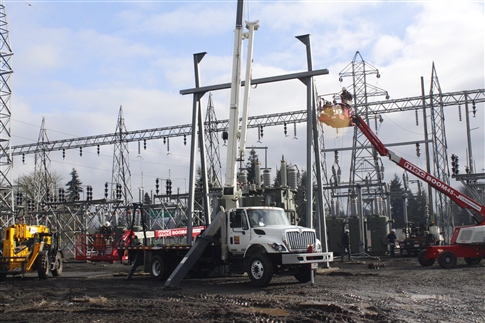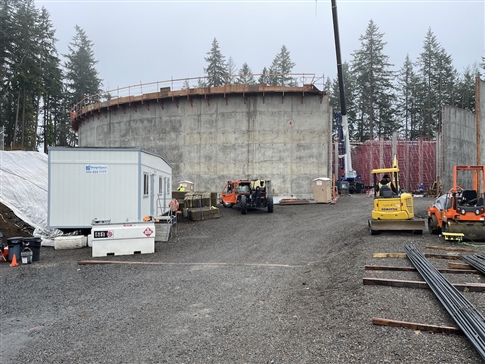Related News
Related News
-
EWEB Board of Commissioners selects BPA administrator for general manager role
In a unanimous vote, EWEB’s Board voted to move forward with negotiating an employment offer to BPA’s John Hairston.
Find Out More -
EWEB and Lane Electric Cooperative sign agreement to transfer EWEB's McKenzie Valley customers
EWEB and Lane Electric Cooperative have reached an important milestone in transitioning electric service from EWEB to Lane Electric in the McKenzie Valley. The two utilities have officially signed agreements for EWEB to sell its electric service territory in the McKenzie Valley to Lane Electric.
Find Out More -
EWEB Board adopts 2026 organizational goals to guide utility priorities
At the January public meeting, EWEB adopted a new set of organizational goals for 2026, providing direction for our work priorities in the year ahead.
Find Out More -
Cold temperatures this week drive highest electricity demand of the winter so far
Frosty conditions in Eugene this week have driven electricity demand to the highest levels so far this winter as heaters strain to keep homes and businesses warm.
Find Out More -
Our Favorite Photos of 2025
For a final look-back at 2025, we’d like to share some of our favorite photos that illustrate our work day-in and day-out. We celebrate amazing teamwork, vital partnerships, and sing the praises of our individual champions and their quiet dedication to serving our community!
Find Out More -
Sustainability Snapshot - Celebrating Energy Efficiency Projects in the Community
Sustainability Snapshops highlight impactful projects completed by EWEB's Customer Solutions department, as a way to celebrate the meaningful work happening behind the scenes.
Find Out More -
EWEB Sets 2026 Budget and Rates, Advances Evaluation of McKenzie Valley Service Territory Realignment
Taken together, the 2026 budget and rate adjustments and the territory-realignment evaluation reflect EWEB’s dedication to responsible financial stewardship, modern, resilient utility infrastructure, and thoughtful planning for the future.
Find Out More -
Let's Talk Turkey. Is your family ready for winter?
We're heading into the holidays, but that also means snow, ice, and not-so-nice weather might be in the forecast. Here are some tips to prepare in advance.
Find Out More -
EWEB Hosts Annual Spill Drill to Protect McKenzie River
EWEB led emergency responders in its annual “spill drill” on the McKenzie River on Wednesday, Oct. 15, at the Trail Bridge Campground.
Find Out More -
A day in the life: Monitoring water quality throughout the McKenzie Watershed
Follow Senior Environmental Specialist David Donahue as he collects water quality samples from throughout the watershed as part of EWEB's early warning system for threats to Eugene's drinking water.
Find Out More -
EWEB Partners with Eugene School District 4J to Celebrate New Kennedy Middle School Emergency Water Station Site
Hundreds of attendees practiced filling up water containers at Saturday's demonstration event.
Find Out More -
Electric Projects underway in North & South Eugene
Underground lines and disaster-resilient power poles are part of EWEB’s infrastructure upgrade near Eugene’s largest natural resource area.
Find Out More -
The Bonneville Power Administration Rate Change and Your EWEB Bill
BPA’s finalized rate increase is smaller than projected, and EWEB’s pass-through adjustment effective October 1, 2025 will now be 2.7% for residential customers—down from the anticipated 4%.
Find Out More -
Quartz Creek: Setting the Stage for Floodplain Restoration
The project resets the floodplain along 1.8 miles of a formerly channelized creek to improve water quality, fish habitat and natural disaster resiliency.
Find Out More -
Pure Water Partners: 5 Years of Regeneration
As EWEB and the Pure Water Partners observe the fifth anniversary of the Holiday Farm Fire, we celebrate major milestones in the watershed's recovery and check back in with PWP landowners who still have a lot of work ahead as they continue to rebuild their lives.
Find Out More - Show More
Every week is Infrastructure Week
May 17, 2023 • Jen Connors, EWEB Communications

National Infrastructure Week (May 14-20) may be a politically charged quip on the national stage, but for EWEB, the urgency and importance of infrastructure is no joke.
Infrastructure is critical to quality of life, public safety, economic vitality, and so much more. But the electric grid and drinking water systems we all rely on are threatened by age, natural disasters, and climate change.
Recurrent heat waves and prolonged droughts are creating conditions for more frequent wildfires and impact our rivers that provide drinking water and power generation. Extreme weather events can lead to higher demand for electricity, stressing our energy systems, as demonstrated by the February 2021 ice storm in Texas and September 2022 heat wave in California that nearly caused rolling blackouts.
As the consequences of climate change continue to unfurl season after season, other risks loom.
In the last decade, new science on the Cascadia Subduction Zone earthquake has emerged indicating that electricity, water, and other public services could be disrupted for weeks or even months following a severe earthquake. The Oregon Resilience Plan, a report issued by the Oregon Seismic Safety Policy Advisory Commission, paints a chilling picture of what Oregon might look like after such an earthquake, describing Cascadia as “Oregon’s Greatest Natural Threat.”
Much of the infrastructure our community relies on for vital services was built in an era of needs and technologies that are very different from today. As an example, Eugene’s base level water tanks, which store 55 million gallons of drinking water, were constructed before modern seismic standards were created. And most of our community’s electric and water infrastructure — the pipes, poles, substations, power plants, and other facilities that serve all Eugene homes and businesses — were built in the 1960s and 70s during a time of rapid population growth for Eugene. As a result, EWEB is dealing with a bubble of aging infrastructure — projects and equipment that are reaching their end of life all at once and now require massive investment.
A new era of infrastructure investment
EWEB is already taking steps to mitigate these risks and ensure our customers have clean, safe, reliable water and power, even as critical infrastructure ages and new challenges arise.
Thanks to a robust capital budget, funded in part by customer rates, we are in a new era of infrastructure investment — rebuilding and modernizing the equipment and facilities that deliver your power and water.
Here are a few of the major projects planned or underway:
- Rebuilding substations to increase capacity and improve reliability, starting with the Currin Substation near Garden Way and I-105.
- Upgrading and supplementing water storage tanks, including building new earthquake-proof tanks near E. 40th Ave, and soon replacing College Hill Reservoir with seismically resilient storage.
- Building a water treatment plant on the Willamette River to diversify and improve the resiliency of our water supply.
- Upgrading the Carmen-Smith Hydroelectric Project to continue generating low-cost, clean, local power.
Investing today for a resilient tomorrow
How we plan, design, and execute these infrastructure projects today will shape Eugene’s future. EWEB is prioritizing resiliency — using modern strategies to protect systems from earthquakes and other natural disasters, and to allow those systems to adapt to uncertain future conditions.
An example of resilient infrastructure planning is EWEB’s approach to building new water storage. Over the next decade, we are replacing Eugene’s three massive tanks that were built between the 1930s and 1960s with six smaller tanks. This distributed approach makes it easier for us to take one tank offline for repairs, providing operational flexibility while making our system more resilient to disruption.

These water storage tanks, substations and other critical power and water facilities are being constructed to modern seismic standards, to withstand a Cascadia earthquake. No infrastructure is entirely protected from disasters, but by prioritizing resiliency we can reduce the likelihood, magnitude, and duration of disruptive events. The new Willamette River water treatment plant, for example, will be designed to come back online within 24 hours of an earthquake.
These investments are vital to meet the growing demands of our community and to fortify our electric grid and drinking water systems against the challenges posed by climate change and other risks.
Your rates keep the lights on and the water flowing
As Eugene’s publicly owned utility for 112 years, EWEB has a long history of investing in our community. Our infrastructure includes everything from power plants to distribution and transmission lines, from substations to transformers, from pipes and reservoirs to pump stations. It’s a complex system that requires investment and maintenance to provide constant, reliable power and water.
Today we are stewards of our community’s $1.3 billion worth of assets that deliver clean, safe, and reliable power and drinking water. As an EWEB customer, you own and help fund that infrastructure. When you pay your EWEB bill, you’re not just paying for the electricity and water you used, you are investing in the health, safety, livability, and economic future of your community.
Related Programs
We're making investments to prepare, replace and maintain our community's water system.
EWEB's 10-year Capital Improvement Plan for major infrastructure investments to rehabilitate, replace, and install new infrastructure will ensure we meet the current and future needs of our community, while maintaining reliable service.



